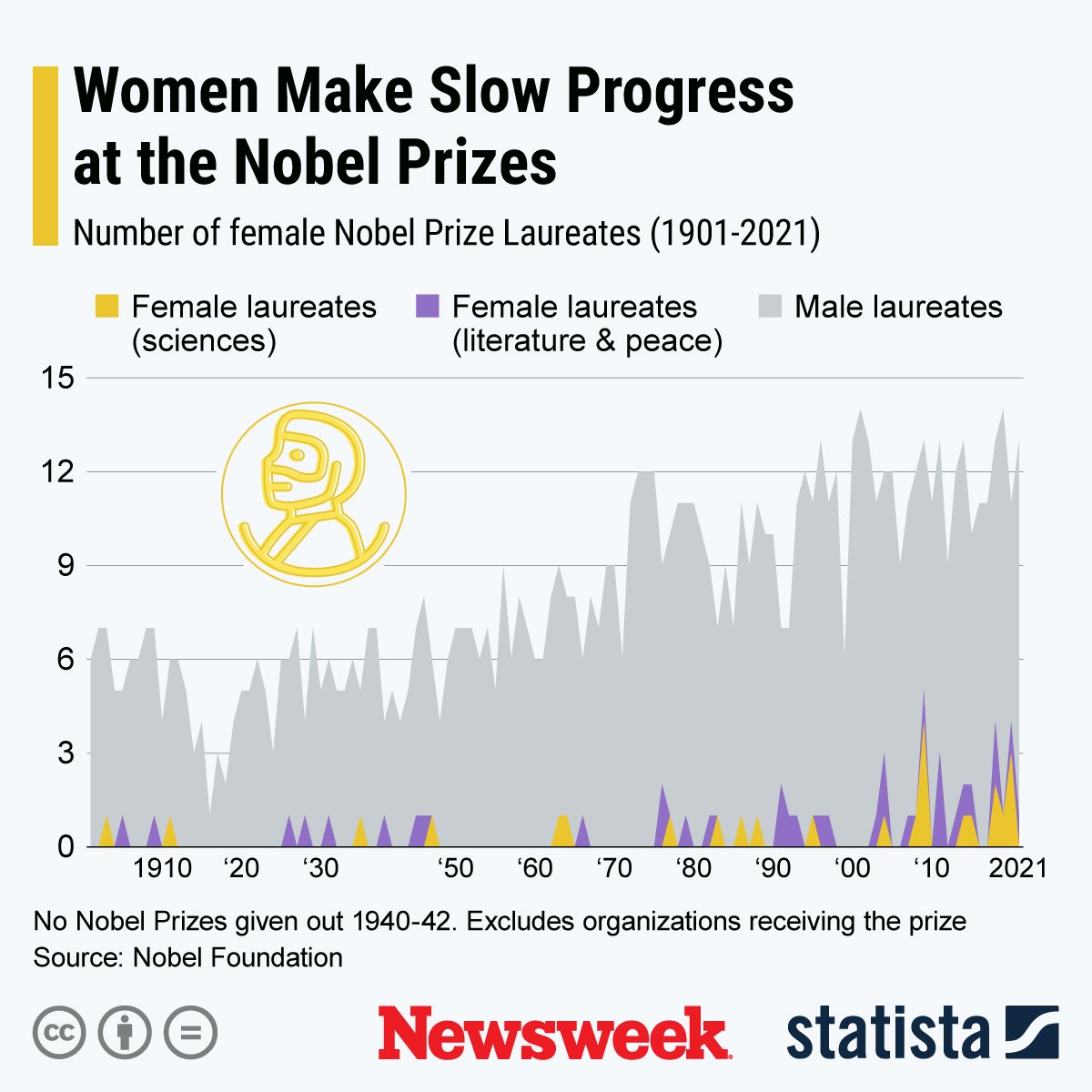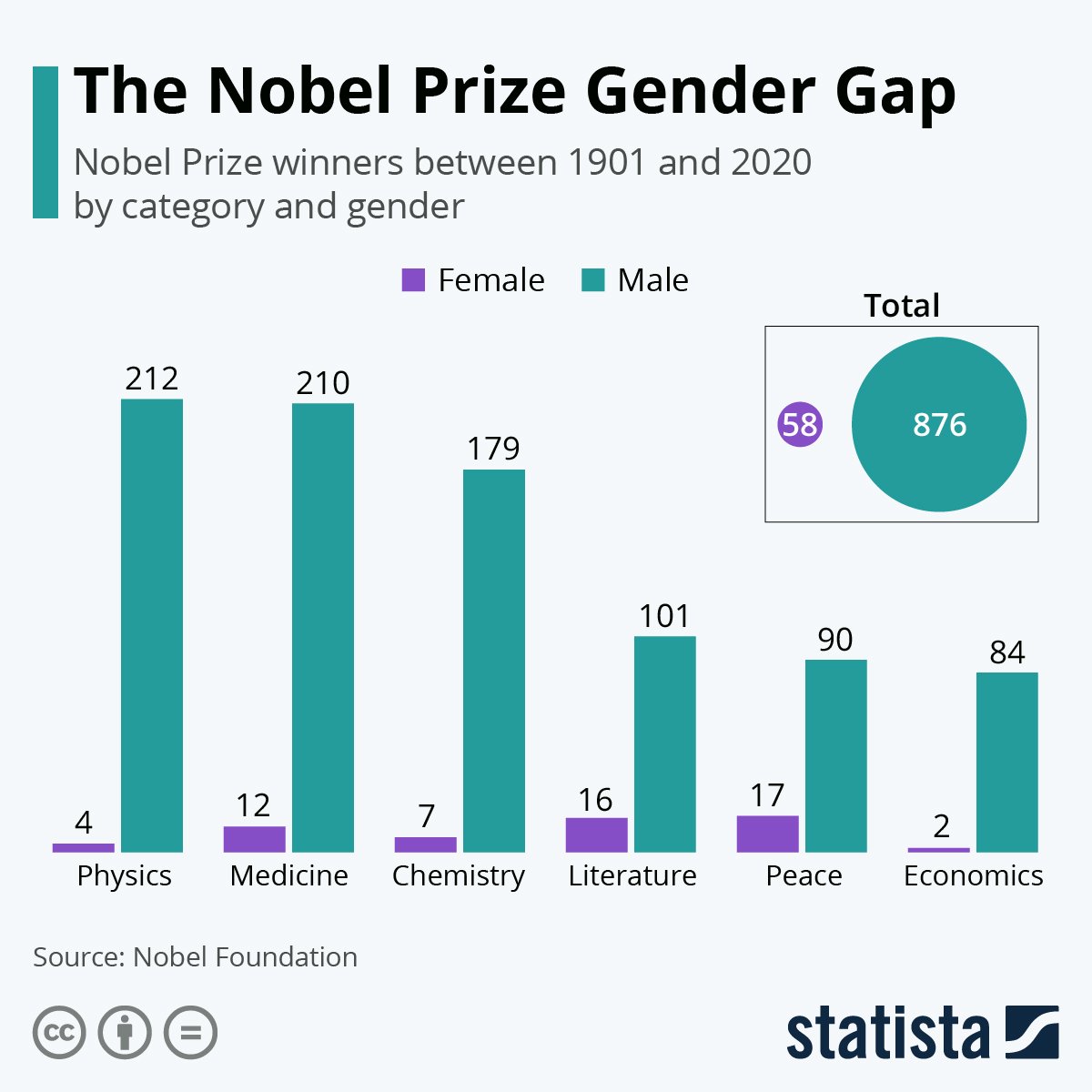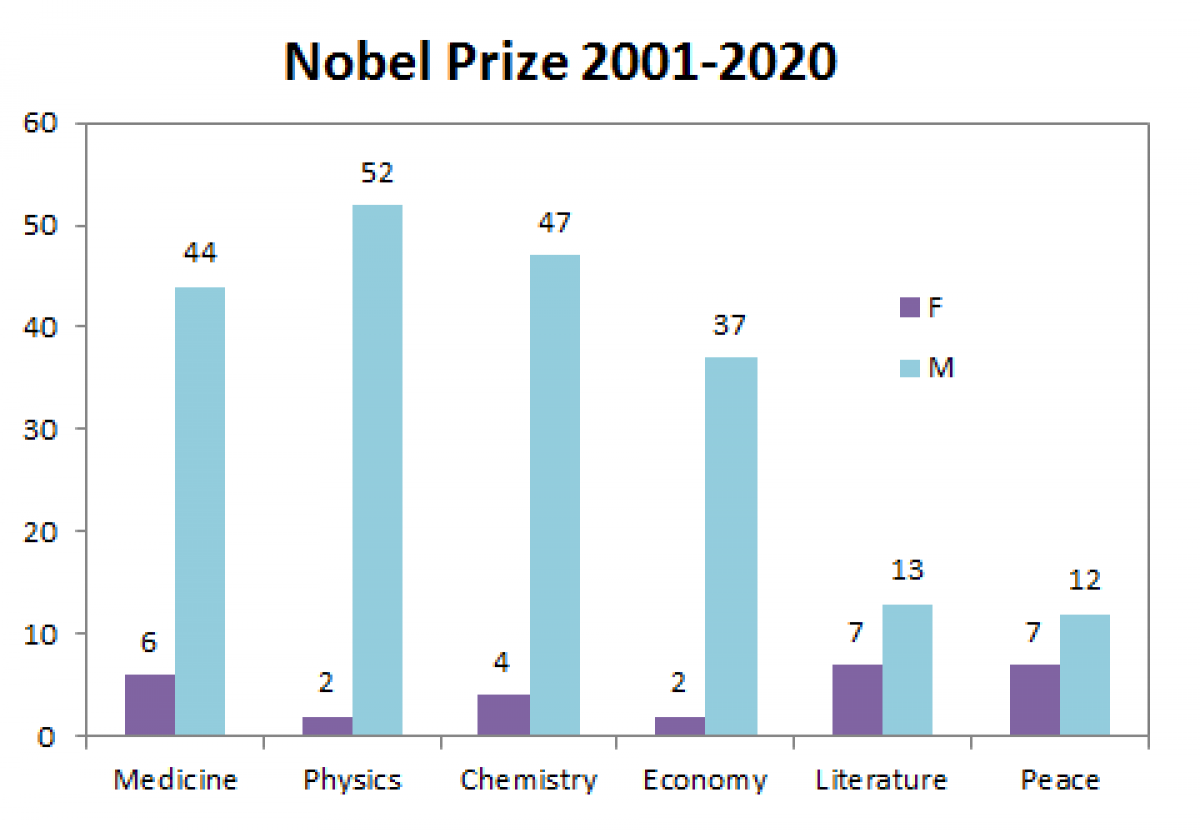The laureates list for sciences at the 2021 Nobel Prizes doesn't include a single woman, widening the gap between male and female recipients of the prestigious awards.
History was made last year when the 2020 chemistry prize went to two women. It was the first time a science award had been given solely to a team of women since the inception of the prize in 1901. Emmanuelle Charpentier and Jennifer A. Doudna claimed the chemistry award for their development of a genome editing method.
On the flip side, teams of men without women had shared the prize 172 times up to Wednesday's announcement. The Nobel Prize in chemistry this year went to Benjamin List and David MacMillan for the development of asymmetric organocatalysis.
"It is worrying that after more than 120 years of existence of this prize, only 58 women have been awarded the Nobel prize, compared with 876 men that received this award up until 2020," astrophysicist and postdoctoral researcher at Universidad ECCI in Bogotá, Colombia, Luz Ángela García, told Newsweek. "And the gap is bigger when looking at the areas of physics and chemistry, but the situation isn't better in economy or medicine."

Of the 609 Nobel awards granted to laureates over the past 120 years, only 58 women have received prizes. The graph below created by Statista last year shows the gender disparity in Nobel Prize recipients.

With regards to Nobels in physics, chemistry and medicine, there have been 631 winners (many of them in groups), and of these only 23 have been women.
Since 1901, four women have claimed the prize in physics out of 219 winners, seven have taken the prize in chemistry out of 188 winners, while 12 women have been recognized in the field of medicine out of 224 winners in that category.
The Nobel Prize for economics has the fewest female laureates in the science categories. Of the 89 winners of this prize only two have been women.
Donna Strickland is a professor in the Department of Physics and Astronomy at the University of Waterloo. In 2018, she shared the Nobel in physics with Gérard Mourou for the development of a method to generate high-intensity, ultra-short optical pulses. In doing so, she became the first woman in over half a century to be awarded the physics prize.
"It was and continues to be such an honor for me to share the Nobel Prize in Physics in 2018. It was beyond my wildest dreams to have my name alongside those of Marie Curie and Maria Goeppert Mayer," Strickland told Newsweek. "Honestly, I was unaware until soon after my name was announced that I was only the third woman awarded with the physics prize and the first female physics laureate in 55 years.
"When I was a student, I was one of only a few women in my classes, and I had no female professors. Since then, the number of women in STEM fields has grown substantially. So I am hopeful and optimistic that the excellent contributions of female scientists will be acknowledged and appreciated more often and soon."
How sad is this graph? pic.twitter.com/MkZoCcaziQ
— Dr Nisreen Alwan 🌻 (@Dr2NisreenAlwan) October 4, 2021
Because the awards are given out in hindsight, sometimes for work completed many years ago, it's often pointed out that the disparity between male and female laureates simply reflects the gender disparity that existed in the sciences until recently.
When Associate Professor in Public Health at the University of Southhampton Dr. Nisreen Alwan posted the graph produced by Richter in 2020 on Twitter many people pointed this justification out to her.
Teresa Valdés-Solís, a scientist at the Instituto Nacional del Carbón in Spain, responded to the criticism of Alwan, with further data that showed the disparity has continued over the previous two decades.
She told Newsweek: "I think that undoubtedly the winners have made important achievements to be awarded the Nobel Prize. There are many other scientists around the world that also have such achievements, including a great number of women.
"This is a trend that shows that women are out of the nominations or that their contribution to science is considered less important than that of their colleagues."

Between 2001 and 2021 of the 57 physics laureates only two were women, while of the 53 winners in chemistry four were female. Of the 52 Nobel medicine winners in that period, just six were women.
That means that since 2001 there have been 162 new Nobel laureates in these science categories, and only 12 have been women. Under 8 percent of the Nobel science winners in the past twenty years have been female.
"The main concerning point to me as a scientist is that the numbers should have started rising about 10 years ago because the active presence of women in science increased notably in the '60s and '70s," Garcia added. "Therefore, their work and contributions should have been awarded 30-40 years later, but this trend does not seem to be happening."
Valdés-Solís agreed. The Instituto Nacional del Carbón researcher added: "It is not a lack of women scientists, it is not lack of talent. It is failing to realize that it is upsetting that none of the science prizes is given to a woman, can you imagine the opposite situation happening?"
The trend of overlooking women in the Nobel science categories continued despite the fact that the Royal Swedish Academy of Sciences, which runs the Nobel Prize awards, has pledged to be more inclusive. In 2018, the academy's secretary-general, Göran K. Hansson, sent a letter to scientists asking them to actively consider geography and gender when nominating candidates.
The biomedical scientist also requested that more women nominate potential Nobel laureates. In October 2019, Hansson told Nature that the move had resulted in a small trend in female nominations, but could not provide the exact figures.
"We've gone through the nominations and although I cannot give you any exact figures, it looks like there is a positive trend, with more women being nominated. It's small, but it's a trend," Hansson said. "We will follow this very carefully for several years to see if there is statistical significance before we draw any firm conclusions.
"But it looks like we may be on the right track. With time, there will also be a gradual change in the population of scientists who are potential candidates, so that will help too."
Garcia added that many women who made massive contributions to their fields went unrecognized by the Nobel committee. "Contributions from Lise Meitner and Rosalind Franklin were overlooked at their time. Jocelyn Bell Burnell was never awarded the prize for the discovery of pulsars, although her Ph.D. supervisor and his collaborator did," the astrophysicist concluded. "These gender imbalances are perpetuated with the numbers, and despite the efforts from the Nobel committee, further work is needed.
"Otherwise, more women will eventually leave their fields because of the lack of opportunities and the lack of recognition and visibility for their investigations."

Update 10/11/21 at 7 a.m. ET: This article was updated to include comments from a former prize winner.
Uncommon Knowledge
Newsweek is committed to challenging conventional wisdom and finding connections in the search for common ground.
Newsweek is committed to challenging conventional wisdom and finding connections in the search for common ground.
About the writer
To read how Newsweek uses AI as a newsroom tool, Click here.








